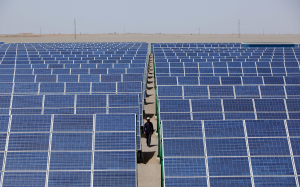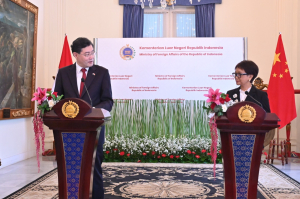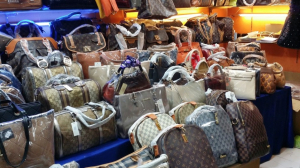Illegal textile imports continue to flood Indonesian market, crippling local businesses
Indonesian textile businesses are expressing concerns about the ongoing influx of illegal textile imports from China.
Redma Gita Wirawasta, the Chairman of the Association of Indonesian Fiber and Filament Yarn Producers (APSyF), estimates that tens of thousands of containers of illegal clothing imports from China have flooded the Indonesian market this year.
"Illegal imports enter without paying Value Added Tax (VAT), Import Duty, Income Tax, and Luxury Goods Sales Tax (BMTP) and are then sold in retail without VAT, while local products are required to pay VAT from the raw materials to the finished garments," Redma said.
He explained that the prevalence of illegal textile imports from China is evident in the discrepancies between Chinese Customs data and Indonesian Central Statistics Agency (BPS) data.
Chinese Customs data indicates that textile exports from China to Indonesia amount to US$ 6.50 billion. However, BPS data shows that textile imports from China are only US$ 3.55 billion.
He believes that the US$ 2.95 billion difference in imports is attributed to illegal imports into Indonesia. Assuming an import value of IDR 1.5 billion per container, he estimates that 28,480 containers of illegal textiles enter Indonesia each year, or 2,370 containers per month.
Consequently, he suggests that illegal textile products currently dominate approximately 41% of the total consumption in the Indonesian market, estimated to reach US$ 16 billion in 2022.
Resulting in massive layoffs
Redma also stated that the prevalence of illegal imports has made it difficult for the domestic textile industry to compete in the domestic market.
"As a result, we struggle to sell in the domestic market, our warehouse stocks are substantial, cash flow is hindered, we cannot purchase raw materials, and we are forced to reduce production and rationalize our workforce," said Redma.
Despite sending letters to the Directorate General of Customs and Excise (DJBC) and requesting an audience, there has been no response, according to Redma.
He mentioned that the issue has caught the attention of the Ministry of Economic Affairs, but no solution has been found so far.
" We have submitted letters to DJBC and requested an audience, but we have never received a response. This issue has also been a concern for the Ministry of Economic Affairs, but there has been no solution for more than a year," Redma said.
According to the Central Statistics Agency (BPS) report, Indonesia imported a total of 2.20 million tons of textiles and textile products in 2021, a 21.1% increase compared to the previous year's 1.82 million tons. The largest portion of imported clothing in Indonesia comes from China.
A total of 990.20 thousand tons of textiles and textile products were imported from China, accounting for 44.86% of last year's total imports.
Brazil ranks second with a total of 174.80 thousand tons of textile and textile product imports to Indonesia. Meanwhile, the United States (US) ranks third by importing 137.90 thousand tons of textiles and textile products into the country.
Already have an account? Sign In
-
Start reading
Freemium
-
Monthly Subscription
20% OFF$29.75
$37.19/MonthCancel anytime
This offer is open to all new subscribers!
Subscribe now -
Yearly Subscription
33% OFF$228.13
$340.5/YearCancel anytime
This offer is open to all new subscribers!
Subscribe now







